Alternatively known as how I wrote an essay in two days (long story, no time to tell) on the themes of economic globalization (EG), the role of media in EG, and two “Made in the USA” companies – and how I’m relating that to this post.
[Let’s backtrack.]

Source: Giphy
(Disclaimer: You’ll be seeing a lot of air quotes, ignore them, the reason that the air quotes are there is another area of study entirely, here in this post we’re trying to focus on writing and research related stuff.)
Why was I writing this essay? To explore how media, specifically ads, play a role in economic globalization, and to explore the effects that economic globalization has on less dominant, non-western countries, which in Communication studies, are referred to as the “global south”.
What is economic globalization? Well it’s basically the spread of western private enterprises (and the accompanying western cultural values/ideas) into foreign markets/countries, which are typically less powerful (economically and militarily) than the ‘industrialized’ west.
How do/es media/the two “Made in the USA” companies contribute to EG? Well, that’s what I set out to explain, starting at around 2pm this past Sunday. And kudos to Michael Kleine, I was on the four stages of his research project like a novice ice skater on ice for their first performance. (Meaning trying my best and hoping desperately that I wouldn’t fall through the ice before my allotted time was up.)
[End backtracking.]

Source: totalprosports
(Also, spoiler alert, we’re going to be focusing on those four stages in this post.)
The Four Stages of the (ess)A(y)pocalypse
1. Collecting Data
I collected data like it was the newest release of every books series that I have ever loved ever. Both of my Communication textbooks were open and highlighted to Antartica and back. I had tabs open on: labor statistics, the store locations of the two companies mentioned above, the products these companies made, where they made those products, et cetera, et cetera, et cetera. I basically binged on data.
2. Sifting for Relevance
Keeping in mind Tirabassi’s principles of closure and cross reference though, I made sure that everything I collected was at least relevant to my topic – and that I limited the amount that I collected to what I could realistically analyze. The statistics? Related to the effects globalization had on foreign labor workers. The store locations, the products? Related to where the companies had foreign outreach. And so on.
3. Seeking Patterns
I tried my best to become a pattern seeking mastermind. I probably didn’t succeed, but I did notice some patterns when going through my data. Like how, despite economies in which the average person cannot realistically afford products that are $100 US Dollars and above, western companies continue to advertise these goods in the countries with said economics. Another pattern? How advertisements sell not only products, but imagined lifestyles. (Again, this is a discussion dedicated to another subject entirely, so I won’t go into too much detail.)
4. Translating into Writing
AKA, the majority of my Sunday and Monday evenings. I took the data I’d collected, sifted, and analyzed for patterns – and put it through the translator, me. Old ideas were framed, challenges to those old ideas introduced, and then my thoughts on how two companies (in this case, Apple and Bose Corporation) demonstrated the effects of EG on the global south were sewn into the essay quilt. Major translation, from corporate America to college student 101.
Okay! So that was a brief summary of the amazing race that I ran through, and an analysis of my efforts and how they reflect the four stages of Kleine’s described ‘hunting and gathering’ process for research! For anyone, I hope this at least somewhat demonstrates how, intentionally or not, many of us embody Kleine’s four stages whenever we write a research paper.
Sidenote: This post was meant to go up on the Tuesday that I turned in my economic globalization essay, but the internet was having a “Treat Yo Self” day and decided to not connect to my laptop.


